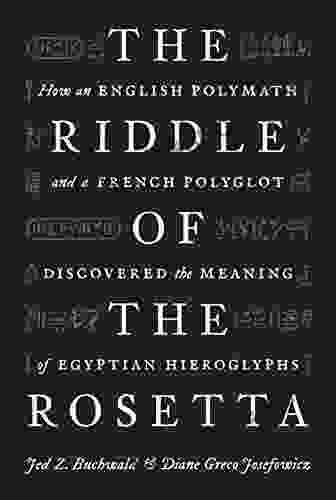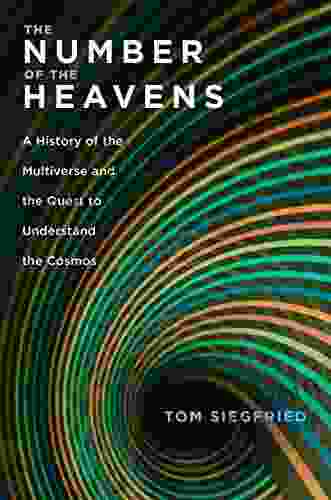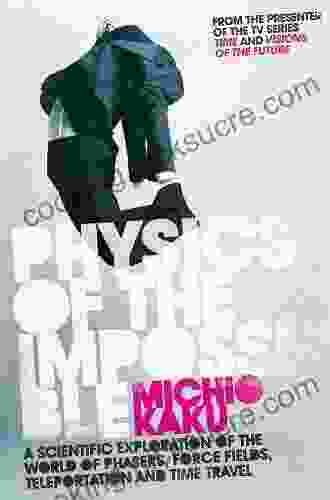Unveiling the Enigma of the Multiverse: A Comprehensive Journey into the Origins and Mysteries of the Cosmos

Throughout history, humans have gazed at the night sky, drawn to its celestial wonders and the vastness of the universe. The pursuit of understanding our place within this cosmic tapestry has led to the development of scientific theories that explore the origins and evolution of the universe. Among these theories, the concept of the multiverse has emerged as a captivating and enigmatic idea, challenging our perception of reality.
4.7 out of 5
| Language | : | English |
| File size | : | 17057 KB |
| Text-to-Speech | : | Enabled |
| Screen Reader | : | Supported |
| Enhanced typesetting | : | Enabled |
| Word Wise | : | Enabled |
| Print length | : | 336 pages |
Historical Roots of the Multiverse Theory
Ancient Cosmologies and Mythologies
The idea of a multiverse can be traced back to ancient civilizations. In Babylonian mythology, for instance, the goddess Tiamat gave birth to a celestial pantheon, including the universe and its antipode, Kur. Similar concepts can be found in Hindu cosmology, which describes the universe as a cyclical process of creation and destruction.
Early Scientific Speculations
In the 17th century, the philosopher and scientist René Descartes proposed the idea of an infinite universe filled with an infinite number of worlds. This concept was later expanded upon by the astronomer William Herschel, who observed the Milky Way and theorized that the universe consisted of countless star systems.
Modern Scientific Theories of the Multiverse
With the advent of modern physics, particularly relativity and quantum mechanics, the scientific understanding of the multiverse has evolved significantly.
The Big Bang Theory
The Big Bang Theory, which is widely accepted as the prevailing cosmological theory, describes the origin of the universe as a cataclysmic event that occurred approximately 13.8 billion years ago. While the Big Bang Theory does not explicitly state the existence of a multiverse, it provides a framework for understanding how our universe came into being.
String Theory
String Theory, a contender in theoretical physics, proposes that the fundamental building blocks of the universe are not particles but tiny, vibrating strings. According to String Theory, there may be as many as 10500 different vacuums, each with its own set of physical laws. These vacuums could give rise to multiple universes, collectively known as the multiverse.
Quantum Mechanics and the Multiverse
Quantum mechanics, which deals with the behavior of matter at the atomic and subatomic level, also lends support to the idea of a multiverse. The many-worlds interpretation of quantum mechanics, put forward by Hugh Everett III, suggests that every possible outcome of a quantum event occurs in a separate universe. This implies the existence of a vast ensemble of universes, each with its own unique history.
Evidence for the Multiverse
While the idea of a multiverse remains speculative, there are intriguing observations that align with its existence.
Cosmic Microwave Background Radiation
The Cosmic Microwave Background Radiation (CMB) is an electromagnetic radiation that permeates the universe, believed to be a remnant of the Big Bang. Researchers have detected slight variations in the temperature of the CMB, which could be interpreted as evidence for collisions between universes or the interaction of our universe with neighboring universes.
Dark Matter and Dark Energy
Dark matter and dark energy are mysterious substances that account for approximately 95% of the energy in the universe. Their nature and distribution remain poorly understood, but their behavior could provide clues about the existence of a multiverse.
Implications and Challenges
The multiverse theory has far-reaching implications and presents significant challenges to our understanding of the universe.
Implications for Physics and Cosmology
If the multiverse exists, it would revolutionize our understanding of physics and cosmology. It would challenge the concept of a single, unified theory of everything, as each universe could have its own unique set of laws. Additionally, it would raise questions about the nature of time, space, and causality.
Challenges in Verifying the Multiverse Theory
Verifying the existence of the multiverse poses significant challenges. Our current instruments and technological capabilities may not be able to detect or observe other universes. Moreover, the vastness of the multiverse, if it exists, makes it difficult to study or explore.
The history of the multiverse theory is a captivating tale of scientific inquiry and philosophical speculation. While the quest to understand the cosmos and our place within it continues, the concept of a multiverse remains an alluring and enigmatic possibility. Future developments in physics, cosmology, and technology may provide new insights into the nature of the multiverse, shedding light on the profound mysteries of the universe.
References
- What Is the Multiverse? by Scientific American
- The Multiverse by NASA
- The Multiverse: What It Is and Why It Matters by Space.com
- Multiverse by The American Physical Society
- The Multiverse by Nature Physics
Image Credits
- Hubble Sees Most Distant and Ancient Galaxies in Early Universe by NASA
- The Big Bang Theory by Space.com
- Strings at the Edge of the Universe by Symmetry Magazine
- Cosmic Microwave Background Temperature by NASA
- Dark Matter and Dark Energy by Space.com
4.7 out of 5
| Language | : | English |
| File size | : | 17057 KB |
| Text-to-Speech | : | Enabled |
| Screen Reader | : | Supported |
| Enhanced typesetting | : | Enabled |
| Word Wise | : | Enabled |
| Print length | : | 336 pages |
Do you want to contribute by writing guest posts on this blog?
Please contact us and send us a resume of previous articles that you have written.
 Fiction
Fiction Non Fiction
Non Fiction Romance
Romance Mystery
Mystery Thriller
Thriller SciFi
SciFi Fantasy
Fantasy Horror
Horror Biography
Biography Selfhelp
Selfhelp Business
Business History
History Classics
Classics Poetry
Poetry Childrens
Childrens Young Adult
Young Adult Educational
Educational Cooking
Cooking Travel
Travel Lifestyle
Lifestyle Spirituality
Spirituality Health
Health Fitness
Fitness Technology
Technology Science
Science Arts
Arts Crafts
Crafts DIY
DIY Gardening
Gardening Petcare
Petcare Chiara Marletto
Chiara Marletto Leigh Bardugo
Leigh Bardugo Robin Mamlet
Robin Mamlet James Geary
James Geary Mason Deaver
Mason Deaver Jennifer Blair
Jennifer Blair Rob Taylor
Rob Taylor Paco Underhill
Paco Underhill Shaun Assael
Shaun Assael Lena Shev
Lena Shev Catie Czora
Catie Czora Kyle Keegan
Kyle Keegan Victoria Schwab
Victoria Schwab Marcus Felson
Marcus Felson Christian Keur
Christian Keur Tony Herman
Tony Herman Joseph Terry
Joseph Terry Ann Gadzikowski
Ann Gadzikowski Michael Judge
Michael Judge C B Lee
C B Lee Kelly Tyler Lewis
Kelly Tyler Lewis Wildlife Trusts
Wildlife Trusts Linda Anne Silvestri
Linda Anne Silvestri Laird Hamilton
Laird Hamilton Anne Bogel
Anne Bogel Patrick Mouratoglou
Patrick Mouratoglou Sorin Dumitrascu
Sorin Dumitrascu Joelle Charbonneau
Joelle Charbonneau Stan Tekiela
Stan Tekiela Andrew Greiner
Andrew Greiner James Branch Cabell
James Branch Cabell Margaret Thorsborne
Margaret Thorsborne Ralph Zuranski
Ralph Zuranski Ivan Pastine
Ivan Pastine Josh Tabor
Josh Tabor Paul Abell
Paul Abell Andrea Komlosy
Andrea Komlosy Joseph Luzzi
Joseph Luzzi Stacey Little
Stacey Little Michael Anderle
Michael Anderle L Michele Issel
L Michele Issel Raymond E Feist
Raymond E Feist Rashid Khalidi
Rashid Khalidi Jefferson Hawkins
Jefferson Hawkins Katharine B Soper
Katharine B Soper Andrew Duncan
Andrew Duncan Lilith Starr
Lilith Starr Mike Cyra
Mike Cyra Daniel P Murphy
Daniel P Murphy Rachel Hawkins
Rachel Hawkins John Ramirez
John Ramirez Mary Keith Piasecki
Mary Keith Piasecki Galit Shmueli
Galit Shmueli Rashers Tierney
Rashers Tierney Gregory Curtis
Gregory Curtis James Dodson
James Dodson Dana Mccullough
Dana Mccullough John Gilbert
John Gilbert Rich Luhr
Rich Luhr Necoco
Necoco Patrick W Galbraith
Patrick W Galbraith Ronald D Davis
Ronald D Davis Rachel Atwood
Rachel Atwood Whitney Nelson
Whitney Nelson Anne Holler
Anne Holler Wendy Heard
Wendy Heard Tom Lecompte
Tom Lecompte Lauren Daniels
Lauren Daniels Bruce Mcnall
Bruce Mcnall Eugene Raikhel
Eugene Raikhel Susanna Kearsley
Susanna Kearsley Richard Maury
Richard Maury Jaak Panksepp
Jaak Panksepp Bill O Neill
Bill O Neill Stephan J Guyenet
Stephan J Guyenet Christopher Sommer
Christopher Sommer Jack Purdum
Jack Purdum Elizabeth S Meckes
Elizabeth S Meckes Pete Pfitzinger
Pete Pfitzinger Andrew Beyer
Andrew Beyer Peter David
Peter David Andrew St Pierre White
Andrew St Pierre White Julie Miller
Julie Miller Andrej Spec
Andrej Spec Arous Brocken
Arous Brocken Thomas S Kuhn
Thomas S Kuhn Bobby Orr
Bobby Orr Andrew Brown
Andrew Brown Antonio Iturbe
Antonio Iturbe Peter Mcbride
Peter Mcbride Tillie Walden
Tillie Walden James E Wisher
James E Wisher Frances Evesham
Frances Evesham Charlotte Elkins
Charlotte Elkins Jenn Brandt
Jenn Brandt Wolfgang Hohlbein
Wolfgang Hohlbein Malinda Lo
Malinda Lo Sheila Jasanoff
Sheila Jasanoff Steve Bisheff
Steve Bisheff Michele Leathers
Michele Leathers Jakub Marian
Jakub Marian Brock Eide
Brock Eide Brandon Mull
Brandon Mull Eric Engle
Eric Engle Rachael Chapman
Rachael Chapman Karen Robson
Karen Robson Andrea Flores
Andrea Flores Keith Sutton
Keith Sutton Greg Ruth
Greg Ruth Jay Annelli
Jay Annelli Rachel Meltzer Warren
Rachel Meltzer Warren Jessica Mccrory Calarco
Jessica Mccrory Calarco Marta Szabo
Marta Szabo E K Johnston
E K Johnston Jacqueline Edmondson
Jacqueline Edmondson Linda Eyre
Linda Eyre David W Brown
David W Brown Romney Steele
Romney Steele Bisco Hatori
Bisco Hatori Sara Manning Peskin
Sara Manning Peskin Peter May
Peter May Leslie Morgan Steiner
Leslie Morgan Steiner Elizabeth Marshall Thomas
Elizabeth Marshall Thomas Laura Domino
Laura Domino 24th Edition Kindle Edition
24th Edition Kindle Edition 18th Edition Kindle Edition
18th Edition Kindle Edition Mike Gauthier
Mike Gauthier Terry Ann Williams Richard
Terry Ann Williams Richard Clayton Everline
Clayton Everline Galen Wolf
Galen Wolf C L Mississippi Morgan
C L Mississippi Morgan Sarah Castille
Sarah Castille Jimmy Elliott
Jimmy Elliott Daniel Humm
Daniel Humm Steven Johnson
Steven Johnson Richard P Feynman
Richard P Feynman Sudhir Shirwadkar
Sudhir Shirwadkar Thomas Watson
Thomas Watson Mark Hume
Mark Hume Robin Ha
Robin Ha Gemma Rogers
Gemma Rogers Steven H Weintraub
Steven H Weintraub Connie J Wells
Connie J Wells Steve Sheinkin
Steve Sheinkin Robyn Sheldon
Robyn Sheldon Sandy Stott
Sandy Stott Joey Miller Msw Lcsw
Joey Miller Msw Lcsw Nic Oatridge
Nic Oatridge Kirby Arnold
Kirby Arnold Richard Bolstad
Richard Bolstad George Mahood
George Mahood Andrea Hudy
Andrea Hudy D Harvey
D Harvey Jamie Ivey
Jamie Ivey Ricky Moore
Ricky Moore A J Carlisle
A J Carlisle David Abram
David Abram Bruce D Perry
Bruce D Perry Jeff Davis
Jeff Davis James R Morrow Jr
James R Morrow Jr Nikola Tesla
Nikola Tesla Lucia Ashta
Lucia Ashta Lars Muhl
Lars Muhl Christina Kim
Christina Kim Victoria Ortiz
Victoria Ortiz Meiso
Meiso Jay Greeson
Jay Greeson Laura Lincoln Maitland
Laura Lincoln Maitland Ruby Walker
Ruby Walker Luke Hohmann
Luke Hohmann Ian O Connor
Ian O Connor Bob Mayer
Bob Mayer Luke Rosiak
Luke Rosiak Benedict Carey
Benedict Carey Andrea Cataldo
Andrea Cataldo Pat Wray
Pat Wray James Rebanks
James Rebanks Ben Orlin
Ben Orlin James Willstrop
James Willstrop Nancy Mcwilliams
Nancy Mcwilliams Robert B Yonaitis
Robert B Yonaitis Denise Riebe
Denise Riebe Marissa Meyer
Marissa Meyer Mike Davenport
Mike Davenport Gabby Rivera
Gabby Rivera Ewen Levick
Ewen Levick Will Thornton
Will Thornton Christos Lynteris
Christos Lynteris Erich Neumann
Erich Neumann Melissa Reynolds
Melissa Reynolds Thomas Meyer
Thomas Meyer Gaurav Suri
Gaurav Suri David Alloway
David Alloway Matt Fulks
Matt Fulks Patrick Hatt
Patrick Hatt Morihei Ueshiba
Morihei Ueshiba George Christian Pappas
George Christian Pappas Hasok Chang
Hasok Chang Nick Marshall
Nick Marshall Arianna Astuni
Arianna Astuni Melissa Caughey
Melissa Caughey Sandra Glosser
Sandra Glosser Rajani Katta
Rajani Katta Robert Bacal
Robert Bacal J David Logan
J David Logan Frans De Waal
Frans De Waal Mara Vorhees
Mara Vorhees Vertamae Smart Grosvenor
Vertamae Smart Grosvenor Kenneth S Shultz
Kenneth S Shultz Catherine Montgomery
Catherine Montgomery Buster Benson
Buster Benson Ken Gullette
Ken Gullette Mark Mcconville
Mark Mcconville Annette Curtis Klause
Annette Curtis Klause Ian Tattersall
Ian Tattersall Paul Rooyackers
Paul Rooyackers Kelsie Stelting
Kelsie Stelting Peter Boardman
Peter Boardman Kindra Gordon
Kindra Gordon Paul Stamets
Paul Stamets Michael T Nygard
Michael T Nygard Brian C Muraresku
Brian C Muraresku Bernard Moitessier
Bernard Moitessier Bridget Portmann
Bridget Portmann Gillian Tett
Gillian Tett Kristine Papin Morris
Kristine Papin Morris Gary Thomas
Gary Thomas Laurie Seale
Laurie Seale Brenda Reed Pilcher
Brenda Reed Pilcher Nathaniel Philbrick
Nathaniel Philbrick Christine Heppermann
Christine Heppermann Metin Bektas
Metin Bektas Stephen Chbosky
Stephen Chbosky Becky Lomax
Becky Lomax Leslie Sokol
Leslie Sokol Joseph Bruchac
Joseph Bruchac Andrew Feinberg
Andrew Feinberg Janet Wolanin Alexander
Janet Wolanin Alexander Bruce Bowlen
Bruce Bowlen Rupert Sheldrake
Rupert Sheldrake Peter Scazzero
Peter Scazzero Usa Pickleball Association
Usa Pickleball Association Paul Kalas
Paul Kalas Chris Lilly
Chris Lilly Marcus A Pfeiffer
Marcus A Pfeiffer Lynne L Finch
Lynne L Finch Sid Thatte
Sid Thatte Ronald J Harshbarger
Ronald J Harshbarger Robert H Miller
Robert H Miller Ola Ola
Ola Ola Carrie Ryan
Carrie Ryan Tracy Townsend
Tracy Townsend Ed Willes
Ed Willes James Lyons Weiler
James Lyons Weiler Michael Hermann
Michael Hermann David Montgomery
David Montgomery Jim Shea
Jim Shea Kiersten White
Kiersten White Ronald W Doerfler
Ronald W Doerfler Geoffrey Wolff
Geoffrey Wolff Kathryne Kennedy
Kathryne Kennedy Kjartan Poskitt
Kjartan Poskitt Walter Greiner
Walter Greiner Caren Van Slyke
Caren Van Slyke S Fatou
S Fatou Michio Kaku
Michio Kaku Patsy M Lightbown
Patsy M Lightbown Roland Martin
Roland Martin George E P Box
George E P Box Mandy Baggot
Mandy Baggot Mira Kirshenbaum
Mira Kirshenbaum Gwendolyn Griffith Lieuallen
Gwendolyn Griffith Lieuallen Dot Edu
Dot Edu William Gerin
William Gerin Charles H Hapgood
Charles H Hapgood Department Of Defense
Department Of Defense Raymond Coppinger
Raymond Coppinger Andrea Curtis
Andrea Curtis Andrea Wachter
Andrea Wachter Joe Cavallaro
Joe Cavallaro Serena Valentino
Serena Valentino Dorothy Pang
Dorothy Pang Steven J Matthiesen
Steven J Matthiesen Kylie Lee Baker
Kylie Lee Baker Jon Gillespie Brown
Jon Gillespie Brown Jennifer Anne Davis
Jennifer Anne Davis Kailin Gow
Kailin Gow Marvin L Bittinger
Marvin L Bittinger Shane Ryan
Shane Ryan George Hospodar
George Hospodar Steve Caplin
Steve Caplin Samantha Rodman
Samantha Rodman Noel Janis Norton
Noel Janis Norton Bettina Bonifatti
Bettina Bonifatti Leslie Vedder
Leslie Vedder Luigi Gabriele Conti
Luigi Gabriele Conti Robert Hamill
Robert Hamill Brad Schoenfeld
Brad Schoenfeld Carmen Micsa
Carmen Micsa Victoria Allman
Victoria Allman Terence Callery
Terence Callery Dayton O Hyde
Dayton O Hyde Maria Konnikova
Maria Konnikova Erica Hoke
Erica Hoke Andrea Olson
Andrea Olson James Mallory
James Mallory Anna Holmwood
Anna Holmwood Suzy Ashworth
Suzy Ashworth Jason Welker
Jason Welker Andrew Blauner
Andrew Blauner John Bantin
John Bantin Andrew Goliszek
Andrew Goliszek Pietro Matracchi
Pietro Matracchi Anne Marie Meyer
Anne Marie Meyer Steven Poses
Steven Poses Bhavesh Mamtani
Bhavesh Mamtani Andrew Doughty
Andrew Doughty Oliver Perkins
Oliver Perkins Richard Bellman
Richard Bellman Jeremy Freese
Jeremy Freese Andrea Gonzales
Andrea Gonzales Roberto Pedreira
Roberto Pedreira Minal Hajratwala
Minal Hajratwala David Borgenicht
David Borgenicht James Turnbull
James Turnbull Nick Peters
Nick Peters Joseph Ledoux
Joseph Ledoux Joe Posnanski
Joe Posnanski Timothy Johnson
Timothy Johnson Lonely Planet
Lonely Planet C L Werner
C L Werner Marta Obiols Llistar
Marta Obiols Llistar Mary Jane Sterling
Mary Jane Sterling Paulette F C Steeves
Paulette F C Steeves Aldous Huxley
Aldous Huxley Garcilaso De La Vega
Garcilaso De La Vega Joe Wells
Joe Wells Jen Calonita
Jen Calonita Sameera Khan Rd Pa C
Sameera Khan Rd Pa C J E Lendon
J E Lendon Neil Oliver
Neil Oliver Andrew Gelman
Andrew Gelman Vin T Sparano
Vin T Sparano Jenny Mackay
Jenny Mackay Trish Allison
Trish Allison Robin Hobb
Robin Hobb Kevin Cook
Kevin Cook W J Hendry
W J Hendry Steven M Fiser
Steven M Fiser Bernard Craw
Bernard Craw Future Publishing
Future Publishing Deaver Brown
Deaver Brown Steve Anthony Tallon
Steve Anthony Tallon Craig Custance
Craig Custance Gerald A Moore Sr
Gerald A Moore Sr Laurie Ann Thompson
Laurie Ann Thompson Doug Swisher
Doug Swisher Steve Scott
Steve Scott Robert Sky Allen Ph D
Robert Sky Allen Ph D Sue Fierston
Sue Fierston Tod Schimelpfenig
Tod Schimelpfenig Baz Thompson
Baz Thompson Daniel Shiffman
Daniel Shiffman Loren Pope
Loren Pope Christine Balaz
Christine Balaz Roger Atwood
Roger Atwood John Morton
John Morton Tim Wharnsby
Tim Wharnsby Isabel Sterling
Isabel Sterling Jason Zemcik
Jason Zemcik Course Hero
Course Hero Gabrielle Coleman
Gabrielle Coleman Guillermo Ferrara
Guillermo Ferrara Cliff Wilson
Cliff Wilson Dylan Norton
Dylan Norton Milo Stewart
Milo Stewart Seth Reichelson
Seth Reichelson Zak Mt Standridge
Zak Mt Standridge Stephen Wiggins
Stephen Wiggins Richard Heinberg
Richard Heinberg Rick Heard
Rick Heard Harriet Brown
Harriet Brown Francesca Zappia
Francesca Zappia Dani Jacobs
Dani Jacobs Lundy Bancroft
Lundy Bancroft Claire Maxted
Claire Maxted Andre Watson
Andre Watson Mark M Meerschaert
Mark M Meerschaert April Vahle Hamel
April Vahle Hamel Lisa Bond
Lisa Bond Elizabeth Clor
Elizabeth Clor James Fox
James Fox Robert Jay Lifton
Robert Jay Lifton Kelly Oliver
Kelly Oliver Jim Curran
Jim Curran Jonathan Clements
Jonathan Clements Donna Bollinger
Donna Bollinger Rita Jablonski
Rita Jablonski William Ritter
William Ritter Sunny Anderson
Sunny Anderson Arlo Adams
Arlo Adams Mara Rockliff
Mara Rockliff Lori Shandle Fox
Lori Shandle Fox Candace Clark Trinchieri
Candace Clark Trinchieri Julie Powers
Julie Powers Bernard A Chavis
Bernard A Chavis Emily Henry
Emily Henry Barbara Merry
Barbara Merry Giada De Laurentiis
Giada De Laurentiis Jonathan Cummings
Jonathan Cummings Hugh Raffles
Hugh Raffles Big Daddy Ozone
Big Daddy Ozone Ken Blanchard
Ken Blanchard William F Sensakovic
William F Sensakovic Donald S Murray
Donald S Murray Rizwan Virk
Rizwan Virk Cathal Armstrong
Cathal Armstrong Ben Doughty
Ben Doughty Jennifer L Armentrout
Jennifer L Armentrout Hampton Sides
Hampton Sides Steven Arms
Steven Arms Chris Mcmullen
Chris Mcmullen Thomas Berger
Thomas Berger Greg Presto
Greg Presto Jim Apfelbaum
Jim Apfelbaum Florent Buisson
Florent Buisson Brian Azzarello
Brian Azzarello Jack Hunnicutt
Jack Hunnicutt Leisy J Abrego
Leisy J Abrego Richard N Aufmann
Richard N Aufmann Chris Salisbury
Chris Salisbury David Scott
David Scott Stuart L Kaplan M D
Stuart L Kaplan M D Ryan Pellett
Ryan Pellett Nancy B Rapoport
Nancy B Rapoport Pliny The Elder
Pliny The Elder Jenna Miscavige Hill
Jenna Miscavige Hill Rolf Potts
Rolf Potts Charles Szypszak
Charles Szypszak Andy Bull
Andy Bull Kristen Thone
Kristen Thone Rick Westhead
Rick Westhead Tim Ryan
Tim Ryan Robin Satty
Robin Satty Matt Richtel
Matt Richtel Rob Summers
Rob Summers Sean Pidgeon
Sean Pidgeon Susan Williams White
Susan Williams White Kerri Andrews
Kerri Andrews Adam Mansbach
Adam Mansbach Simon Garfield
Simon Garfield Sarah Outen
Sarah Outen Martin Rooney
Martin Rooney Hayley Campbell
Hayley Campbell V E Schwab
V E Schwab Tamara Ireland Stone
Tamara Ireland Stone Nancy Mather
Nancy Mather Richard Munson
Richard Munson H Spencer Lewis
H Spencer Lewis Bonita Norris
Bonita Norris Elizabeth S Trafalgar
Elizabeth S Trafalgar Stephanie Cacioppo
Stephanie Cacioppo Prasad Raju V V N R Pathapati
Prasad Raju V V N R Pathapati Tom Siegfried
Tom Siegfried Andrea Cremer
Andrea Cremer Namina Forna
Namina Forna Jason Louv
Jason Louv Jed Z Buchwald
Jed Z Buchwald Andrea Bemis
Andrea Bemis Jordan Romero
Jordan Romero Tom Lodziak
Tom Lodziak Kristin Briney
Kristin Briney Kathleen Dean Moore
Kathleen Dean Moore M D Johnson
M D Johnson Riley Black
Riley Black James A Middleton
James A Middleton Karen Tranberg Hansen
Karen Tranberg Hansen Michael S Malone
Michael S Malone Dr Gabriel Peter Salgo
Dr Gabriel Peter Salgo
Light bulbAdvertise smarter! Our strategic ad space ensures maximum exposure. Reserve your spot today!

 Federico García LorcaThe Extraordinary Journey: A Man's Epic Cycle from India to Europe for Love
Federico García LorcaThe Extraordinary Journey: A Man's Epic Cycle from India to Europe for Love Christopher WoodsFollow ·11.8k
Christopher WoodsFollow ·11.8k Herb SimmonsFollow ·7.4k
Herb SimmonsFollow ·7.4k Ervin BellFollow ·2.7k
Ervin BellFollow ·2.7k Elmer PowellFollow ·5.1k
Elmer PowellFollow ·5.1k Dominic SimmonsFollow ·8.9k
Dominic SimmonsFollow ·8.9k Wesley ReedFollow ·3k
Wesley ReedFollow ·3k Edward ReedFollow ·6k
Edward ReedFollow ·6k Todd TurnerFollow ·3k
Todd TurnerFollow ·3k

 Demetrius Carter
Demetrius CarterGolf Scrimmages: Realistic Practice Games Under Pressure
Golf scrimmages are...

 Andres Carter
Andres CarterAhsoka Tano: The Force-Wielding Togruta Who Shaped the...
Ahsoka Tano is one of the most...

 Greg Foster
Greg FosterUndeath Ascendant: A Blood-Soaked Literary Odyssey into...
Immerse yourself in a macabre tapestry of...

 Paulo Coelho
Paulo CoelhoHow an English Polymath and French Polyglot Discovered...
The Rosetta Stone is...
4.7 out of 5
| Language | : | English |
| File size | : | 17057 KB |
| Text-to-Speech | : | Enabled |
| Screen Reader | : | Supported |
| Enhanced typesetting | : | Enabled |
| Word Wise | : | Enabled |
| Print length | : | 336 pages |














